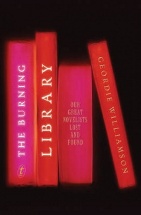The Burning Library by Geordie Williamson

Text Publishing, 2012. ISBN 9781921922985.
(Age: Mid secondary - Adult) Recommended. Is 'greatness an attribute
that we value in authors anymore'? In The Burning Library: Our
Great Novelists Lost and Found, Geordie Williamson takes the
provocative stance, particularly against Australian academia, that
students are not exposed to enough of our greatest writers. Of
course, 'greatness' can be subjective but Williamson believe that
the Australian literary canon has been dismantled by academics 'in
the name of greater inclusiveness and democracy' - hence the
perceived equal value of a bus ticket and Moby Dick, for example.
Williamson is knowledgeable and erudite and his book will hopefully
generate, if not 'Literature Wars', but a powerful petition for
study of Australian classics.
About fourteen authors and their works are analysed in dedicated
chapters, although there is overlap between these writers and also
those not featured, such as Thea Astley. Williamson focuses on his
chosen authors' most important works, or those that advance his own
thesis. Even though Williamson explains why he has selected these
authors, it would be interesting for readers to add to his list.
Thomas Shapcott and David Foster come to mind. And conversely, how
can Williamson justify including Thomas Keneally and Patrick White
as overlooked writers, even if White may not be read as much as
expected? Female writers form about fifty percent of the content - a
laudable but unforced effort by Williamson. They include Elizabeth
Harrower, Christina Stead and Amy Witting (who, incidentally, worked
at Sydney's Cheltenham Girls' High School).
The Burning Library is a useful resource to scaffold close
study of the chosen authors and their texts in secondary and
tertiary institutions. Quotes from great writing are also analysed.
But will this book tempt young readers to read any of the featured
literature? I think it could be the catalyst for a fascination with
Australian literature but, of course, nothing beats reading the
books themselves.
Joy Lawn